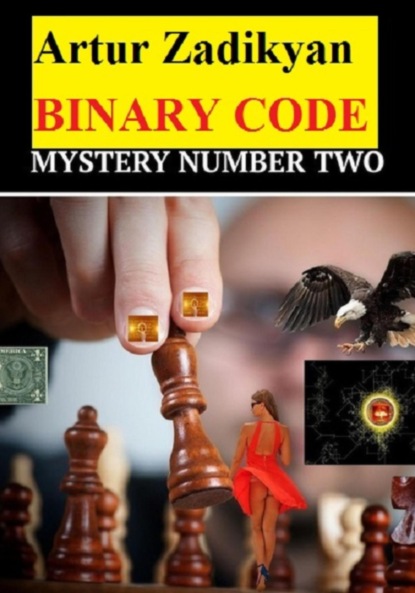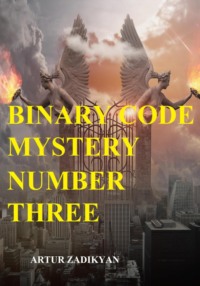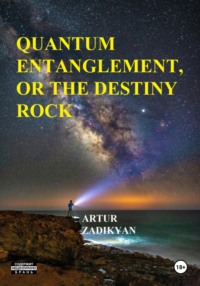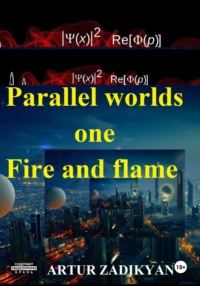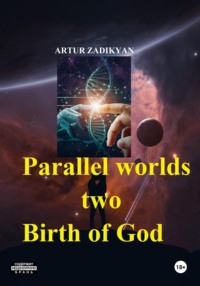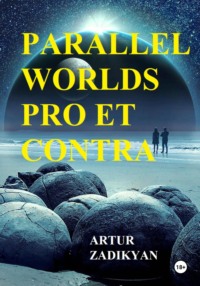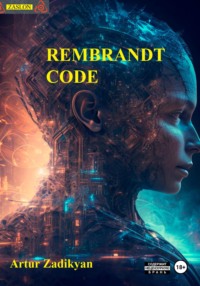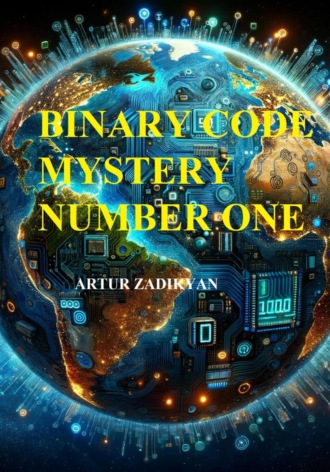
Полная версия
Binary code: Mystery number one

Artur Zadikyan
Binary code: Mystery number one
Part One: The Binary Code. Center Zero
Was there a civilization on Earth before ours? Some think yes, others think no, but all suspect that there are secret organizations that influence the course of our history. This book is about such a structure. The book will be of interest to fans of mysteries, exciting adventures and those who want to look behind the facade of super secrecy. It is not the real reality that is around us, yet not everyone sees it. We do not want to realize that the world and life exist in a subtle "corridor" of existence, but, discovering secret after secret, we are forced to admit it.
He who controls the past owns the future.
Chapter 1: In the beginning there was an event

It was an ordinary day, or rather, morning, and nothing unusual should have happened in it, or rather – there were no direct preconditions for it, but, as usual, something extraordinary happened. Many people believe that time is not material, that it has no physical substance, that if there is no physical component, at least one particle of atom's nucleus, there will be no time, because there is no something against which it can be measured. As we know, history teaches people that it teaches nothing, and time as an independent, independent event constantly proves it. It proves that it exists, regardless of whether there is anything else but it. And this time time has once again cracked. Its component could not withstand the artificial alteration of its course and shouted out loud: "My time has come!" This morning time cracked and the "wheel" of history rolled into another uncharted distance.
– Rutra Tigrovich Paskhov, why are you sleeping, time will not wait for you! – Captain Klimov shouted in his half-joking manner from beside his bunk.
– What happened? I was on watch," Ruthra muttered, throwing a disgruntled look at the duty officer, meaning: "How did you get in? Why didn't you warn me?"
Although Klimov was senior in rank, he did not have a security clearance level to a highly classified part of the facility.
Knowing Klimov's mannerisms, Ruthra realized that he was aware of what had happened in the country, so he thought not of that, but of why he had put it that way. Apparently, although their structure knew everything in advance, the clash of forces was so massive that the outcome was still unpredictable.
It was the morning of August 18, 1991. The further events were known to everyone, and their internal structure and the reasons that led to them are the subject of numerous disputes and conspiracy theories.
In a period when everything that could change was changing and everything that could change was being changed, when the beloved country turned into something for some and for others finally disappeared, these events began and lasted until today.
Rutra was fortunate enough to be privy to some of the secrets and especially important values of the state called the Soviet Union. Like many people who had to do with the existence of that system, he developed a certain type of personality. Many people who did not know what the strength of the system was and what it was based on could not understand these people. These people were of that category who never uttered words in vain. Every word, gesture, action, deed and even facial expression had a meaning. That's the way the system had raised them. People like them are called exes; it is said about them that "they have no exes". However, they are not the ones who are known as those who "have no exes", because if not everyone knows about them, then these people do, and nothing is known about these people. Although these people remain human beings with their human concepts of existence, especially within the social economic-political "field" on which they were raised by the system of values they were called to defend. Therefore, at the crossroads of history, which gives not only disruption and cracks to the usual way of life, but also new choices and opportunities, many people took the position that was closer to their hearts. Given the freedom to choose, people showed their true selves. It turned out that many people are not ready to sacrifice themselves – not only their lives, but also their time and lifestyle, and they want big and easy money. And for the sake of this they are ready to compromise moral and ethical taboos. Others could not overstep their conscience and tried not only not to bend moral standards, but also to earn honestly in the new world, where most people have forgotten these principles.
Many were at a crossroads. Ruthra tried to get on with his life and his friends. His friends, comrades and superiors did not forget him, nor did he forget his friends and comrades, for the business they had been trained for was not as such. Though much of the new was a risk to life and a risk to liberty, it was still close in spirit to Rutra and company.
They were people who couldn't live without it. Since there was not much to choose from, Rutra agreed to various special operations. The essence of the case was that it was necessary to travel abroad under the guise of tourists, businessmen, representatives of public or religious organizations (in a word, under someone else's documents) for contacts with various special services.
The fact is that what ordinary citizens see and hear is very different from what it really is. Special services have an unspoken agreement not to disclose the essence of their existence, even if they are opponents. And the essence of the job is for them to exist and be in power all the time. In fact – there is a myth that it is possible to come to power, so to speak, honestly. What is the question? Things seem to happen, but no one will ever be "supreme" in power without the permission of those who are already "supreme" in power. That authority should never be seen by anyone. It's logical. If you wish, you can raise a person in the right spirit from childhood, prepare him and bring him, through all procedures and intermediate links, to any level of power. Having received this power, he can create an illusion of freedom of choice. And this has already happened once and the "supreme" power did not need it.
The essence of the work was to collect, decipher, filter and systematize information obtained through visual, electronic, overt, covert, open and closed sources. The methods, objects and subjects of collection could be very different, from the usual copying, data interception and theft to fantastic non-verbal communications using hypnosis and psychotropic drugs.
However, one of the methods, by which, as if with the help of puzzles, the true picture was assembled, was the most labor-intensive, although the most reliable. An agent literally had to sit at one "point" for years and observe, with or without the use of special equipment, a secret object. It was better, of course, if the agent was embedded in the object, working in some secondary role. Even a janitor was suitable for this. A "secret" object might not be officially secret in status, but its mode, regulations, and functioning were important. For example, information obtained from the places of residence and leisure of persons who possessed scientific, commercial, military or political information could be more significant than information obtained from documents from secret facilities. Everything had to be recorded: who goes where, where they come from, daily routine, drills, repairs, start-up and shutdown times, background indicators and many other seemingly insignificant things. Right down to when a door was opened, when and where lights were turned on and off, what and how much they ate, drank, and listened to.
The use of special equipment was limited, it could itself be the cause of declassification, but in today's world, information flowing through networks and systematized in programs was akin to treasure.
There were many such "caretakers" at different sites. This was called "tacit observation". Thus, for weeks, months, years, the "caretakers" recorded in the form of fables, poems, stories everything that happened at the objects they were interested in. This formed a picture of how the object worked, how it interacted with other objects. All the information was collected in the "first circle" of analysis. In the "first circle" of analysis, a certain algorithm of what was happening was drawn up. Then the whole situation was transferred to the "second circle" of analysis, in which the most important objects, on which the work of all other objects depended, were formalized and designated in more detail.
All information from these centers was sent to an external center, which could be located in a completely different country. There, a complete picture was formed of how, for example, naval groupings functioned. Then all the data was sent to the internal center of the external center. As a result, they knew perfectly well where the subject of interest, this or that employee, officer, representative, team member was located, how the object or management functioned, who was going where, to whom, why, what supplies were coming from where, where and to whom, what developments were underway, what secret agreements had been reached, and much more. All of this was compared with data that came from other agents, or rather spies, added data that was simply bought.
It turned out that there were no secrets. All secrets were only in what and how things were programmed – codes and ciphers, for example. This was the modern world, in which options were calculated like a chess game. That is, for example, the GRU knew perfectly well the capabilities of the U.S. Sixth Fleet, the number of men, the classification of weapons, how they fired and what could be done with them. But what order would come and where would it go, what would be the tactical move? That was unknown. It was quite difficult to guess it, so all possible options were calculated.
The world map is like a chessboard. And if you add weather phenomena, random events like tsunamis, earthquakes or magnetic storms, you get a lot of possible variants. That's why it was decided to take it under control. In order to control this, tectonic weapons and weather-affecting weapons, such as HAARP, were invented.
Since the intelligence services are aware that they know everything about each other, there is an agreement on secret cooperation, but since everyone "puts a spoon in his mouth", everyone tried to hide something. For example, according to the treaty on the reduction of nuclear weapons, an intercontinental missile should have one charge, but in circumvention of this treaty several charges were placed. Naturally, the presence of systems affecting the nervous system, psyche and consciousness of a person was always concealed.
This is how Rutra, working as an analyst and then as head of the external center, spent several years. To hide it, everything was made up as business trips, errands, or just tourism. Sometimes he had to dispatch agents, to keep an eye on sites whose purpose he didn't think were important. For some reason they were important to the Center.
In fact, the bulk of information was obtained from open sources. In the West, it was easy to do this, you could even brazenly collect information under the guise of a good, professional activity. In Russia, especially in the USSR, for this, at best, you could be "sent to the zone". But there everything was simpler. For example, there was a case that Rutra was told about by his guru during his internship in the United States.
In the 1970s, law school graduate James Bamford was bored with practicing law, so he chose the profession of a reporter and worked as a detective in a private detective agency. The idea to write a book about the NSA came to the journalist in 1979, when he noticed that there are many books on the Central Intelligence Agency, but there is almost nothing about the National Security Agency.
In those days, the vast majority of Americans had no idea that such an intelligence agency existed. Nor had they heard of it at Houghton Mifflin, where Bamford approached with his proposal. However, the assertive reporter believed, gave an advance of 7,500 dollars and a term of three years. As Bamford later recalled, his legal education and experience as a detective helped him enormously in the process of writing The Palace of Mystery.
Bamford began his search by reading everything he could find about the NSA in public libraries. But that turned out to be negligible. Since data on NSA personnel and facilities were missing from official Pentagon directories, Bamford began digging up related reports and records of congressional hearings. In notes to the reports of Sen. Frank Church's committee investigating the intelligence community in the mid-1970s, Bamford found references to dozens of specific documents. These documents became the basis for his first three-page Freedom of Information Act-FOIA request to the NSA. It was immediately discovered that the NSA was almost entirely exempt from FOIA under an earlier law protecting the organization from any attempt to disclose its activities. So Bamford's first request was rejected outright.
Not the least bit embarrassed, the journalist went back to the library vaults. A comprehensive list of telephone numbers of U.S. military installations around the world gave no information as to which numbers might correspond to secret NSA radio interception posts. The Senate subcommittee reports dealing with military construction funding were carefully scrubbed clean of any reference to NSA facilities. However, the incurious Bamford noticed that when a secret base decided to build a court or basketball court, the requests were unclassified and showed up in the committee reports. By cross-referencing between military telephone directories and such requests, as well as similarly unremarkable data, Bamford was able to compile a nearly complete list of radio intercept sites in the NSA's global network.
At the same time, the journalist began searching for personal documents of employees of the U.S. radio-intelligence community.
A number of other important sources of information were found in the library.
From these documents, in particular, it was clear that the NSA, which as a foreign intelligence agency is not officially authorized to engage in eavesdropping on U.S. communications systems, does so through cooperation with foreign allies conducting radio intercepts on U.S. soil.
The NSA tried to stop Bamford's "subversive" activities and prosecute him under the Espionage Act. The journalist was accused of obtaining classified documents, but at the time the Reagan administration had not yet succeeded in passing a national security directive allowing for the reclassification of documents.
This is the kind of thing an ordinary journalist could do. It is impossible to imagine such things in the USSR, even in modern Russia. Over time, Rutra got fed up with it and decided to leave the service, as it involved risk to life and danger to freedom. The pay was not bad, but the money came and went. No serious earnings. Days and months went by like "life was a raspberry", you could walk around at your own pleasure. At the moment when he decided, so to speak, to "stop" with it, he received an offer he could not refuse. There are no exes in the system he was in, so it was impossible to just walk away. He didn't want to fulfill cheap requests; he couldn't move up the career ladder either, because he had to serve there and fulfill his assignments. There were changes in the country, and the surrounding reality promised very good prospects. So Rutra was at a crossroads. And then, out of nowhere, Alexander Ivanovich appeared.
Chapter 2: Where is zero?

Alexander Ivanovich was an old, hardened fighter with awards and wounds. He was missing one eye and had a prosthetic instead. He never told what happened to him, but his coworkers whispered that he had this eye removed voluntarily, that instead of an eye there was a special device. They said that instead of an eye he had an artificial eye, or rather, a device with the function of taking pictures, photographing, x-raying and scanning.
Alexander Ivanovich set up an informal meeting.
– We thought you were offended.
– Why all of a sudden?
– You've been illegal for a long time. Usually after a stint abroad, fighters come back and get a rank and file at headquarters.
– What's in it for me?
– You'll get lieutenant colonel ahead of schedule and classified status.
– Which one?
– Head of a think tank at a top-secret facility and access to state secrets.
Rutra had no reason not to believe Alexander Ivanovich, and he never joked, especially not like that, but Rutra was still wary. He knew that one got into such centers either by "inheritance" or for very great merit. Those who worked in special secret centers were checked from birth, and not only for themselves, but as they say, for their entire background.
– I want you to know there's a problem in the system, the system wants a new fighter, with an abstract mindset.
To this, Rutra replied that this was not news to him.
– I'm already in the system.
He knew that Alexander Ivanovich knew he was in the system.
– You know exactly what I mean. I want you to get into the first round, and I want you to get promoted.
– What circle is that?
– The one that includes the special ones. You know perfectly well there's no way out.
– Is that an "aquarium"?
– Sort of. We should take you to Center A. I already talked to the right people today. They've been watching you for a while. But be warned, you're going to the very center. I've set up an early morning meeting.
At 7:00 they were to meet Alexander Ivanovich and go to this "very-most center". In the morning, Alexander Ivanovich picked him up. There was a driver sitting behind the wheel of the company car, who looked suspiciously at Rutra. The license plates were military, series 16. They drove straight out of town and into some kind of specially protected reserve zone, which was impossible to enter, only through a checkpoint with darkened windows. There was a sign on the iron fence that said it was some kind of estate.
The car stopped in front of the gate, no one came out to them, no documents were demanded. Alexander Ivanovich called someone, and the gate opened automatically. They drove for a long time. Rutra was even surprised that some park area, some forest, was the location of a top-secret center.
They reached a miniature house that was buried in greenery on all sides. It was almost invisible. If the road didn't lead to it, they wouldn't be able to find it at all. It was a beautiful house, like a picture. Only part of its facade was visible. Rutra's careful eye determined that there were many camouflaged objects around.
– This is the lodge of the hunter of the international court, – explained Alexander Ivanovich.
– What does that mean?
– We call it that because it decides who will be free and who will be in a cage, dead or alive. Let's go.
They went into the courtyard. Alexander Ivanovich put his thumb to some device, but not on the pad side, as it usually happens, but on the nail side. The door opened.
They went into the house. The furnishings were from the 1950s. Everything was very clean, neat, but no one was there. They went into the hallway, from there into the next room, then into the hall, then into another room. In that room there was a fireplace. Alexander Ivanovich pressed a button on the remote control for the television. The fireplace moved away, and a small platform opened up.
– Stand next to me," he commanded.
Ruthra walked over. They stood on the platform. Alexander Ivanovich pressed a button, and they began to descend. It was an elevator. They descended to the room below. There was another platform there. Alexander Ivanovich pressed another button, and the platform descended to the floor below.
It was dark. He took Ruthra's hand and stepped forward. Ruthra followed. They found themselves in pitch blackness. The platform rose back up.
After a second or two, the light came on. The room was completely empty; there was only plaster on the walls, no paint, no wallpaper. Alexander Ivanovich went out into the corridor; Rutra followed him.
The corridor was illuminated by a dim light. When they reached the end of the corridor, Alexander Ivanovich raised his hand and started waving, as if he was trying to show someone something. Suddenly something clicked, and the wall that was in front of them went down. A passage opened up.
Alexander Ivanovich walked ahead, Rutra followed him. They walked a few meters, and the door closed behind them.
Instead of numbers on the code lock of the next door there were hieroglyphics. Alexander Ivanovich pressed 6 of them – the door opened. It was an elevator vestibule. They went in there, the door closed, the elevator went down. Rutra became wary.
– Where are we going?
– Right in the center.
– But not to the center of the Earth, right? – Ruthra joked.
– Not to the center of the Earth, but to the center that rotates the Earth," Aleksandr Ivanovich answered and pointed his index finger upwards.
Ruthra was silent. It wasn't customary for specialists in such services to talk much, much less joke. Every word was a chain of inferences that could be used to get a lot of information. If someone said something badly or made a joke, let alone acted, it could cost him not only his career, but also his freedom and life. You could be an ex if you had your memory erased, and since there was no such technology, as far as Ruthra knew, he realized that he might share the fate of those who "went nowhere," as the experts put it among themselves.
The elevator stopped, the door opened, and they found themselves in a new corridor, exactly the same as the previous one. Ruthra thought it was a test or some kind of trick.
They walked down the corridor to a door that was disguised as a wall. Alexander Ivanovich waved his hand again, the wall slid open, and they stepped out into another corridor. Rutra thought this was a test of courage, and even began to wonder if he had thought the elevator was only going down. He also remembered that the wall in front of which Alexander Ivanovich had waved had been before the elevator, and here it was after the corridor.
When they reached the wall at the end of the corridor, Ruthra realized something was wrong. It wasn't a wall, but a solid glass door. Either it was covered with a black film or the glass itself was black. On the door was a sign that read: "You are seen, you are not." Alexander Ivanovich put his thumb nail to the device again, something rustled, and the door opened.
Ruthra was surprised at what he saw. It was a huge, two-level room, with a huge globe spinning in the middle of it. There were dozens of computers, different devices, and hundreds of screens arranged in several levels around the perimeter. Ruthra was even taken aback. What struck him most was the globe. It was a huge glowing globe that was projected as a three-dimensional image by a device from below. It showed in detail the topography not only of the land, but also of the ocean floor. And it was moving. Looking closely, Ruthra realized that it was slowly spinning on its axis. There were airplanes flying in the "sky"; tiny satellites hurtling along in their orbits. The artificial sun clearly separated day and night.
– What's up? Let's go," said Alexander Ivanovich.
– I didn't expect this. Where have we gotten to, Alexander Ivanovich?
– I already told you. Right in the center.
– And what is this center?
– Follow me. I'm an old man and my feet hurt, so don't ask too many questions.
Alexander Ivanovich was in his 85th year, he was a bit heavy, so it was hard for him. They walked to the end of the room. No one paid any attention to them, although there was no one to do so – the chairs behind the computers were empty.
They came to the door of the office, on which hung a sign with the inscription: NGTSOI. Alexander Ivanovich knocked and did not wait for an answer. They went into the room. There sat a vivacious grandfather in his sixties.



